
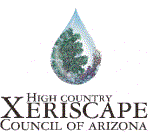
The High Country Xeriscape Council of Arizona is a non-profit 501 C-3 corporation dedicated to educating our communities Tohono Chulabout water-wise gardening. For additional information write:
HCXCA
4397 E AZ Highway 260
Payson, AZ 85541
Denver Botanic Gardens
At Denver Botanic Gardens, the term water-smart is used to describe the methods employed to achieve efficiency in irrigating gardens.  The most dramatic water-smart gardens feature plants that thrive with minimal irrigation. Many of our native plant gardens, such as Dryland Mesa and Laura Smith Porter Plains Garden, have not received supplemental irrigation in five years. Most other gardens at Denver Botanic Gardens receive occasional to regular watering in the heat of summer, but even the thirstiest gardens are watered less than an average landscape in Denver.
The most dramatic water-smart gardens feature plants that thrive with minimal irrigation. Many of our native plant gardens, such as Dryland Mesa and Laura Smith Porter Plains Garden, have not received supplemental irrigation in five years. Most other gardens at Denver Botanic Gardens receive occasional to regular watering in the heat of summer, but even the thirstiest gardens are watered less than an average landscape in Denver.
Water-Smart Gardening® is not a single style or method but a whole suite of techniques and approaches that lead to artistic excellence in the garden in the most ecologically sensitive fashion. It might be described as aesthetic stewardship. When you have a garden utilizing the most appropriate plants for the semi-arid climate and use the latest in best management practices, we believe you will not only save money and resources, but you will also have a far more beautiful and easier landscape to maintain.
Water-smart gardens rely on grasses and a rich mix of native and adapted perennials, annuals and shrubs to provide a long season of bloom, and even longer season of textural appeal. There is no simple cookbook that teaches the water-smart style. It can be wildly romantic at one extreme, or rigidly formal at the other end of the spectrum. The hallmark of water-smart is placing the right plant in the right spot, ease of maintenance and highlighting the style of the West.
Rio Grand Botanic Garden, Albuquerque ![]()
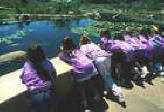
The official site of the Albuquerque Biological Park (BioPark), Albuquerque, New Mexico, which includes The Albuquerque Aquarium, The Rio Grande Botanical Garden, The Rio Grande Zoo and Tingley Aquatic Park. The BioPark consist of exhibits of fishes, animals, flowers and plants, also a wide variety of educational programs, summer programs and special events.
Desert Botanical Garden, Phoenix ![]()
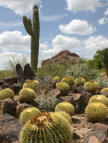 The Garden’s commitment to the community is to advance excellence in education, research, exhibition, and conservation of desert plants of the world
The Garden’s commitment to the community is to advance excellence in education, research, exhibition, and conservation of desert plants of the world
with emphasis on the Southwestern United States. We will ensure that the
Garden is always a compelling attraction that brings to life the many wonders
of the desert.
Lotusland, Santa Barbara ![]()
Lotusland is a unique 37-acre estate and botanic garden situated in the foothills of Montecito to the east of the city of Santa Barbara. The gardens now covering the estate were created by Madame Ganna Walska, who owned the property from 1941 until her death in 1984. Before her death, Madame Walska established the nonprofit Ganna Walska Lotusland Foundation, which now preserves this unrivaled botanical treasure.
The Dallas Arboretum![]()

The Dallas Arboretum is one of the most magnificent gardens in the nation, a visual banquet that is ablaze in color year-round. The fragrant gardens and lush lawns, on the shores of an enchanting lake that overlooks Downtown Dallas, also feature intriguing sculptures, sparkling fountains, and two historic mansions.
Tohono Chul Park is the Southwest's center where nature, art, and culture connect. Walk down the winding nature trail through our various gardens. Tour the exhibits in a renovated historic home. Enjoy breakfast, lunch, or afternoon tea in the Tea Room. Shop in the 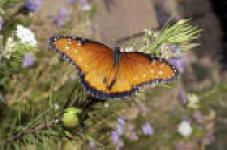 Greenhouse and Museum Shops. Tohono Chul Park is a Tucson treasure. The Park's mission is to enrich people's lives by providing them the opportunity to find peace and inspiration in a place of beauty, to experience the wonders of the Sonoran Desert, and to gain knowledge of the natural and cultural heritage of this region.
Greenhouse and Museum Shops. Tohono Chul Park is a Tucson treasure. The Park's mission is to enrich people's lives by providing them the opportunity to find peace and inspiration in a place of beauty, to experience the wonders of the Sonoran Desert, and to gain knowledge of the natural and cultural heritage of this region.
Chihauhuan Desert Garden, El Paso![]()
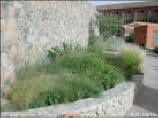
The Chihauhuan Desert is the easternmost and southernmost of the four North American deserts: the Great Basin Desert, the Sonoran Desert, the Mojave Desert, and the Chihauhuan Desert.
Lady Bird Johnson Wildflower Center - Native Plants & Wildflowers ![]()
Founded in 1982 by Lady Bird Johnson and the late Helen Hayes, the Lady Bird Johnson Wildflower Center is dedicated to protecting and preserving North America's native plants and natural landscapes. Our mission - to educate people about the environmental necessity, economic value, and natural beauty of native plants - guides all that we do. Every day, the Wildflower Center's horticulture, restoration, conservation, and environmental education programs bring life to Mrs. Johnson's vision in our gardens and natural areas, and with projects across North America. The Wildflower Center is a 501c(3) non-profit corporation.
to protecting and preserving North America's native plants and natural landscapes. Our mission - to educate people about the environmental necessity, economic value, and natural beauty of native plants - guides all that we do. Every day, the Wildflower Center's horticulture, restoration, conservation, and environmental education programs bring life to Mrs. Johnson's vision in our gardens and natural areas, and with projects across North America. The Wildflower Center is a 501c(3) non-profit corporation.
copyright 2003© HCXCA